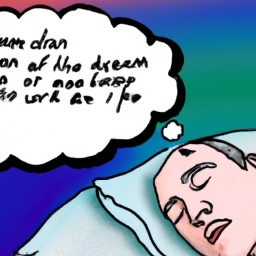It’s truly amazing when you wake up from a dream where you are flying through the sky, winning big, or meeting your favorite celebrity.
You know what’s not great? Waking up from a dream where you’re being chased by a monster, or losing all your teeth, or even worse, showing up to school or work naked.
Yes, my dear reader, I’m talking about those pesky things we all experience at some point in our lives: bad dreams.
They’re like the annoying cousin you’re forced to hang out with at family gatherings – you can’t really get rid of them, but you sure wish you could.
But what exactly are bad dreams, and why do they happen? Join me as we dive into the world of nightmares and try to make sense of them.
Key Takeaways
- Bad dreams are vivid and disturbing dreams that can leave one feeling anxious, scared, and traumatized, usually occurring during the rapid eye movement (REM) stage of sleep.
- They can be caused by stress, anxiety, trauma, medications, and certain foods, and can interfere with quality of sleep and overall well-being.
- Understanding the types of bad dreams can help identify underlying issues, and coping strategies include journaling, talk therapy, and support groups, as well as self-care practices such as exercise, meditation, or spending time in nature.
- Seeking professional help is important if nightmares are causing significant distress or interfering with daily life, and bad dreams in children can be addressed in a supportive and understanding manner, with a calming bedtime routine and professional help sought if necessary.

YFONG Weighted Sleep Mask, Women Men 3D Blocking Lights Sleeping Mask (4.2oz/120g), Pressure Relief Night Sleep Eye Mask with Adjustable Strap, Eye Cover Blindfold for Travel Nap Yoga, Black
[ Perfect Weight for Sleep Faster & Deeper ] Slightly weighted (with 4.2 oz beads, right amount for…
As an affiliate, we earn on qualifying purchases.
As an affiliate, we earn on qualifying purchases.
Definition of Bad Dreams
You know those dreams where you’re falling off a cliff or being chased by a monster? Those are the kind of bad dreams we’re talking about.
Bad dreams, also known as nightmares, are extremely vivid and disturbing dreams that can leave you feeling anxious, scared, and even traumatized. They usually occur during the rapid eye movement (REM) stage of sleep, which is when our brains are most active.
Bad dreams can be caused by a variety of factors, including stress, anxiety, trauma, medications, and even certain foods. Some people are more prone to bad dreams than others, and they can occur at any age.
Although bad dreams are a normal part of the sleep cycle, they can interfere with our quality of sleep and affect our overall well-being.
Now, let’s explore some of the types of bad dreams and what they might mean.

Sleep Essential Oil Blend for Diffuser – Dream Essential Oils for Diffusers Aromatherapy and Relaxation with Clary Sage Ylang-Ylang Roman Chamomile and Lavender for Sleep Time Support (1 Fl Oz)
Aromatherapy Oils for Diffuser – Try our dream aromatherapy diffuser oils blend with lavender oil chamomile oil clary…
As an affiliate, we earn on qualifying purchases.
As an affiliate, we earn on qualifying purchases.
Types of Bad Dreams
When you’re sleeping, sometimes your mind can conjure up some pretty scary or unsettling things that can leave you feeling uneasy upon waking. These are known as bad dreams, and they can take on many different forms.
One common type of bad dream is a nightmare, which involves vivid and frightening imagery that can cause you to wake up feeling scared or anxious. Another type of bad dream is a recurring dream, which is when you have the same unsettling dream over and over again. These types of bad dreams can be especially distressing, as they can leave you feeling like you’re trapped in your own mind.
Other types of bad dreams include anxiety dreams, which are characterized by feelings of worry or stress, and lucid dreams, which are dreams in which you’re aware that you’re dreaming but are unable to wake up.
Each type of bad dream can be caused by different factors, such as stress, anxiety, or even certain medications. Understanding the different types of bad dreams can help you identify what might be causing them and take steps to address the underlying issue.
In the next section, we’ll explore the science behind bad dreams and what causes them to occur.

Magicteam White Noise Machine with 20 Non Looping Natural Soothing Sounds Memory Function 32 Levels of Volume Powered by AC or USB and Sleep Sound Timer Therapy for Baby Kids Adults Black
❤20 Non-Looping Sleep Sounds: White noise ,Brown noise, pink noise, blue noise, fan,brook, rain, ocean,bird and Bonfire,suitable for…
As an affiliate, we earn on qualifying purchases.
As an affiliate, we earn on qualifying purchases.
The Science Behind Bad Dreams
Understanding the science behind what causes unsettling dreams can be a fascinating and eye-opening experience. One of the main theories behind bad dreams is that they’re a result of our brain processing and consolidating memories and emotions from the day.
During sleep, our brain replays these memories and emotions, often in a distorted or exaggerated way, which can lead to the creation of bad dreams. Another theory suggests that bad dreams may be a way for our brain to prepare for potential threats and dangers in the future.
By experiencing these scenarios in a dream, we’re better equipped to handle them in real life. Additionally, some studies have shown that certain medications, substances, and sleep disorders can increase the likelihood of having bad dreams.
With this understanding of the science behind bad dreams, we can begin to explore the common causes of these unsettling experiences.

Nightmare Journal: Daily Diary to Record & Analyze Your Dreams, Track Your Sleep, & Answer Cool Questionnaires (Dream Journal)
As an affiliate, we earn on qualifying purchases.
As an affiliate, we earn on qualifying purchases.
Common Causes of Bad Dreams
I’ve had my fair share of bad dreams, and I know it can be a real nuisance. But did you know that bad dreams can be caused by a variety of factors?
Stress and anxiety, trauma, medications, and sleep disorders are just some of the common culprits.
In this discussion, we’ll explore each of these causes in more detail and learn how they can affect our dream life.
Stress and Anxiety
Stress and anxiety can trigger unsettling dreams that leave me feeling uneasy even after waking up. When I’m under a lot of stress, my mind seems to work overtime, and I often have vivid dreams that leave me feeling drained and exhausted.
Sometimes, these dreams seem to be a reflection of my worries in real life, while at other times, they are entirely irrational and make no sense at all. For instance, I’ve had dreams where I’m being chased by unknown entities or falling from a great height. The feeling of dread and fear is so real that it takes me a while to shake it off even after waking up.
However, I’ve realized that stress and anxiety aren’t the only culprits behind bad dreams. Sometimes, past traumas can also manifest in our dreams, and that’s what we’ll explore in the subsequent section.
Trauma
When you experience trauma, it can haunt you even in your sleep, leaving you feeling uneasy and anxious upon waking. Traumatic experiences can give rise to bad dreams, also known as nightmares.
These dreams can be vivid and intense, making it difficult to distinguish between reality and the dream world. Nightmares caused by trauma can be so distressing that they can disrupt daily activities and lead to further anxiety.
In some cases, trauma survivors may even avoid sleep altogether to prevent experiencing these bad dreams. Fortunately, there are medications that can help manage the symptoms of trauma-related nightmares.
Medications
Fortunately, medications can help manage the symptoms of nightmares caused by trauma, providing relief and allowing for better quality sleep.
There are several types of medications that can be prescribed for this purpose, including antidepressants, anti-anxiety medications, and medications specifically designed to treat nightmares. These medications work by altering brain chemistry to reduce the frequency and intensity of nightmares, as well as improving overall mood and reducing anxiety.
However, it’s important to note that medications shouldn’t be the only solution for managing bad dreams. Along with medication, it’s important to address the underlying trauma through therapy or other forms of support.
It’s also important to discuss any concerns or side effects with a healthcare provider and to follow their instructions carefully.
Next, let’s take a look at how sleep disorders can contribute to bad dreams.
Sleep Disorders
You may be experiencing a rollercoaster of sleep disturbances that can contribute to unpleasant nighttime experiences. One of the most common sleep disorders that can lead to bad dreams is insomnia. Insomnia refers to difficulty falling asleep, staying asleep, or waking up too early. This can leave you feeling exhausted and anxious, which may increase the likelihood of having nightmares. Another sleep disorder that can cause bad dreams is sleep apnea, which is characterized by brief pauses in breathing during sleep. The sudden awakenings that occur as a result of sleep apnea can disrupt normal sleep patterns and lead to vivid, disturbing dreams.
To understand the connection between sleep disorders and bad dreams, it may be helpful to examine how different stages of sleep affect our dreams. Dreams typically occur during the rapid eye movement (REM) stage of sleep, which is when the brain is most active and dreams are the most vivid. However, disruptions to normal sleep patterns can cause REM sleep to occur at unexpected times, leading to strange and unsettling dreams. The following table illustrates how different sleep disorders can affect REM sleep and contribute to bad dreams:
| Sleep Disorder | Effect on REM Sleep | Likelihood of Bad Dreams |
|---|---|---|
| Insomnia | Reduced REM sleep | Increased |
| Sleep Apnea | Disrupted REM sleep | Increased |
| Narcolepsy | Excessive REM sleep | Increased |
These sleep disorders can have a significant impact on the quality of our dreams and our mental health. In the next section, we will explore how bad dreams can affect our overall well-being.
Impact of Bad Dreams on Mental Health
I’ll do my best! As someone who’s experienced the impact of bad dreams on mental health, let me tell you that it can be brutal.
Not only can it affect your mood and overall quality of life, but it can also potentially lead to PTSD.
It’s important to understand the potential consequences of recurring bad dreams and take steps to address them.
Effects on Mood
Experiencing bad dreams can have a significant impact on one’s mood, causing feelings of anxiety and stress. These negative emotions can linger throughout the day, affecting one’s ability to focus and complete tasks. They can also cause irritability and frustration, leading to strained relationships with others.
In addition, bad dreams can make it difficult to relax and unwind, making it harder to get restful sleep and causing a vicious cycle of negative emotions and poor sleep quality. This can lead to constant worry and fear about going to bed at night, as well as persistent feelings of sadness or hopelessness.
The effects of bad dreams on mood can also result in heightened sensitivity to stress and anxiety triggers, difficulty regulating emotions and coping with daily challenges, and an increased risk of developing mood disorders such as depression or anxiety.
To improve mood and overall well-being, it is important to address and manage bad dreams in a healthy way. This can involve seeking support from a healthcare provider or therapist, developing healthy sleep habits, and practicing stress-reducing techniques.
Effects on Quality of Life
The impact of disturbing dreams on one’s overall quality of life cannot be ignored – have you ever felt exhausted and unrefreshed even after a long night’s sleep? This is a common experience for people who suffer from bad dreams. The emotional toll of these dreams can lead to a decrease in productivity, difficulty concentrating, and a lack of motivation. It can also lead to anxiety and depression, which can further exacerbate the negative effects on one’s quality of life.
To further illustrate the impact of bad dreams, consider the following table:
| Effects of Bad Dreams | Examples |
|---|---|
| Physical | Insomnia, increased heart rate, sweating |
| Emotional | Anxiety, depression, fear |
| Behavioral | Avoidance of triggers, decreased social interaction |
| Cognitive | Poor memory, difficulty concentrating |
| Interpersonal | Strained relationships, decreased intimacy |
As you can see, the effects of bad dreams extend far beyond just a restless night’s sleep. In fact, they can have a significant impact on multiple aspects of one’s life. This is why it’s important to address the root causes of these dreams and seek help if necessary. In the following section, we will discuss the potential for PTSD in relation to bad dreams.
Potential for PTSD
Get ready to learn about the potential for PTSD when it comes to disturbing nighttime experiences. Post-traumatic stress disorder (PTSD) is a mental health condition that can develop when someone has experienced or witnessed a traumatic event.
While bad dreams alone aren’t enough to cause PTSD, they can contribute to the development of this condition, especially if the dreams are recurrent and vivid.
In some cases, bad dreams can be related to past traumatic events, and these can trigger a person’s symptoms of PTSD. For example, a person who has experienced a car accident may have recurrent nightmares about the accident, which can cause them to relive the event and experience the same emotions they felt during the accident.
It’s important to note that not everyone who experiences a traumatic event will develop PTSD, and not everyone who has bad dreams will develop this condition either. However, if you’re experiencing recurrent bad dreams or you’re worried about your mental health, it’s important to talk to a mental health professional who can help you understand your symptoms and provide you with the support you need.
Now that you know the potential for PTSD when it comes to bad dreams, let’s explore some prevention strategies that can help you get a good night’s sleep.
Prevention Strategies
One effective way to avoid bad dreams is by establishing a consistent bedtime routine. This routine should involve winding down activities such as reading a book or taking a warm bath before going to bed. Additionally, it is important to avoid consuming caffeine or alcohol before bedtime as they can disrupt your sleep cycle and contribute to bad dreams.
Another helpful strategy is practicing relaxation techniques such as meditation or deep breathing exercises before going to sleep. These practices can reduce stress and anxiety, which are often associated with bad dreams. Additionally, maintaining a comfortable sleeping environment, such as a cool and dark room, can also contribute to a better night’s sleep. By implementing these prevention strategies, you can increase the likelihood of having peaceful and restful nights. As a result, you will be better equipped to handle any challenges that come your way during the day. In the next section, we will explore coping strategies for those who still experience bad dreams despite these prevention techniques.
Coping Strategies
When I have bad dreams, coping can be difficult. However, there are strategies that can help.
Journaling my dreams can help me process and understand them better, while talk therapy can provide a safe space to express my concerns and fears. Support groups can also be a helpful resource, allowing me to connect with others who may have similar experiences.
Additionally, self-care practices like exercise, meditation, and relaxation techniques can help me manage stress and anxiety related to my bad dreams.
Journaling
To effectively process and analyze your bad dreams, start journaling about them. By writing down the details of your dream, such as the setting and characters, you can gain insight into your subconscious thoughts and emotions that may be causing the bad dream.
For example, if you have recurring nightmares about being chased, journaling may reveal that you’re feeling overwhelmed and unable to escape certain stressors in your waking life.
To make your journaling more effective, try these tips:
- Write down the emotions you felt during the dream.
- Keep a consistent journaling schedule, even on days when you didn’t have a bad dream.
- Use descriptive language to fully capture the details of the dream.
- Review your journal periodically to identify patterns or recurring themes.
Journaling can be a powerful tool in understanding and addressing your bad dreams. But if you find that you need additional support, consider seeking talk therapy to further explore and process your subconscious thoughts and emotions.
Talk Therapy
I found that journaling helped me to identify patterns in my bad dreams, but it didn’t necessarily provide me with a solution to stop having them altogether. That’s why I turned to talk therapy.
Speaking with a licensed therapist allowed me to delve deeper into the root causes of my bad dreams and work on coping mechanisms to prevent them from affecting my daily life.
During talk therapy sessions, I was able to process my emotions and experiences in a safe and supportive environment. My therapist helped me to identify triggers that may be causing my bad dreams and provided me with techniques to manage them when they occur.
Through talk therapy, I gained a better understanding of myself and my subconscious mind, which in turn helped me to develop a more positive outlook on life.
As I continue on my journey towards better mental health, I’ve also found solace in support groups. These groups provide a sense of community and understanding, as others share similar experiences and struggles.
Support Groups
Joining a support group can be a beneficial way to connect with others who understand your experiences and provide a sense of community. It can be comforting to know that you are not alone in your struggles with bad dreams. Support groups can provide a safe space for individuals to share their experiences, receive validation, and offer support to others.
One type of support group that may be helpful for those experiencing bad dreams is a dream-specific group. These groups may be led by a therapist or facilitator who specializes in dream work. In these groups, individuals can explore the content and meaning of their dreams, learn coping strategies, and gain insight into their unconscious mind.
In addition to seeking support from others, taking care of oneself is crucial when dealing with bad dreams. Taking time for self-care activities such as exercise, meditation, or spending time in nature can help reduce stress and anxiety, leading to a better night’s sleep.
Self-Care
Treat yourself like a garden, and tend to your needs with activities such as exercising, meditating, or taking in the fresh air to promote a better night’s sleep. These self-care practices can help reduce stress and anxiety, which are often triggers for bad dreams. Personally, I find that taking a walk in nature or practicing yoga before bed helps me relax and prepare for a peaceful sleep.
In addition to physical activity, it’s important to prioritize good sleep hygiene. This includes setting a consistent sleep schedule, avoiding electronics before bed, and creating a calming bedtime routine. Drinking chamomile tea or taking a warm bath can also promote relaxation.
Remember, taking care of yourself is crucial for both physical and mental wellbeing. When we feel our best, we can better cope with stressors that may contribute to bad dreams. Speaking of coping, when’s it time to seek professional help?
When to Seek Professional Help
If nightmares are causing significant distress or interfering with my daily life, seeking professional help is important. This may include talking to a therapist or counselor who specializes in dream analysis as well as seeking medical attention if the nightmares are linked to a physical health condition.
Additionally, if the nightmares are caused by a traumatic event, seeking help from a trauma specialist may be necessary to address the root cause of the nightmares.
Ignoring recurring nightmares can lead to a cycle of fear and anxiety that can negatively impact my mental health. Therefore, it’s important to take action and seek professional help if needed.
Moving forward, understanding how bad dreams affect children can also help me better understand the impact of nightmares on my own mental health.
Bad Dreams in Children
I hope you found the previous subtopic helpful in determining when to seek professional help for bad dreams. As a parent, I know how important it is to take care of our children’s well-being, especially when it comes to their sleep. That’s why I want to talk about bad dreams in children and what we can do to help them.
-
It’s important to listen to your child: When your child wakes up from a bad dream, take the time to listen to them and understand what they’re feeling. Children may have trouble expressing their emotions, so it’s important to provide a safe space where they can talk about their fears and concerns.
-
Create a calming bedtime routine: Establishing a consistent bedtime routine can help ease anxiety and promote relaxation. This can include reading a story, listening to calming music, or practicing deep breathing exercises.
-
Seek professional help if necessary: If your child is experiencing frequent and severe bad dreams, it may be a sign of an underlying issue such as anxiety or trauma. In this case, it’s important to seek professional help from a pediatrician or mental health provider.
Remember, bad dreams are a common occurrence in children, and it’s important to address them in a supportive and understanding manner. By listening to your child, creating a calming bedtime routine, and seeking professional help if necessary, you can help your child overcome their bad dreams and get the restful sleep they need.
Frequently Asked Questions
How can I control my dreams to avoid bad dreams?
To avoid bad dreams, I control my thoughts before sleeping. I focus on positive things and use relaxation techniques like deep breathing. I also avoid watching scary movies or eating heavy meals before bed.
Are there any foods or drinks that can cause bad dreams?
Certain foods and drinks can cause bad dreams for me. Heavy meals, caffeine, and alcohol are some examples. I try to avoid them before bedtime and opt for lighter meals and herbal tea instead.
Can certain medications cause bad dreams?
Some medications can cause bad dreams. I experienced vivid nightmares when I started taking a new medication. It’s important to talk to your doctor if you’re experiencing this side effect.
Is it normal to have bad dreams every night?
Having horrendous, recurring nightmares every night is not normal. Seek professional help to unearth the underlying cause. Stress, anxiety, PTSD, depression, and medication side effects are common culprits.
Can bad dreams be a sign of a deeper psychological issue?
Bad dreams can be a sign of deeper psychological issues such as anxiety, trauma, or depression. It’s important to seek professional help if these dreams are persistent and affecting daily life.
Conclusion
In conclusion, bad dreams are a common experience that can be unsettling and leave a lasting impact on our mental health. While there are various types of bad dreams, they all share a common theme of fear, anxiety, and distress.
The science behind bad dreams is complex, but there are many known causes such as stress, trauma, medication, and sleep disorders. Fortunately, there are various prevention and coping strategies that can be implemented to reduce the frequency and intensity of bad dreams.
These include practicing relaxation techniques, creating a calming sleep environment, and seeking professional help when necessary. By understanding the truth about bad dreams, we can take control of our mental health and enjoy more peaceful sleep.
So next time you have a bad dream, remember that you have the power to overcome it.









